Dear Capitolisters,
As a small-L libertarian with at least a modicum of self-awareness, I know that on many political issues I'm just wired a little differently than much of the general public. (An understatement, I guess.) Yet I remain amazed by the ease with which much of modern society and the media seamlessly move from a personal opinion of "I think X is bad" to "Yes, a federal agency should definitely issue a blanket, unilateral ban of X." This prohibitionist mindset sets off all my libertarian spidey senses—on law, politics, economics, principles, etc.—but it also raises practical and prudential concerns that, I’d think, would move my skepticism beyond the think tank halls and deep into Normieville.
Two recent episodes, however, really have me questioning that assumption: the FTC’s ambitious proposal to make almost all non-compete agreements—including ones already in place—“illegal” under Section 5 of the Federal Trade Commission Act of 1914, and a rumored proposal, since walked back, by the Consumer Products Safety Commission to ban the sale of natural gas stoves.
Judging from the widespread reaction to each proposal online, you’d be forgiven for thinking that both bans were total no-brainers and that opposition came from only cranks and cronies. Non-competes, we were told, do serious and widespread damage to all American workers’ wages and mobility, are never entered into legitimately, and provide absolutely no economic benefits. Anyone skeptical of a total ban thus is just a bootlicking conservative shill for Big Employer. Gas stoves, on the other hand, give millions of American children asthma, promote dirty, rotten fossil fuel consumption, and are totally inferior to new electric induction ranges. Skeptics are just baby-hating, foodie-poseurs and right-wing culture warriors who… as Jonah documented a few days ago, totally made the whole thing up anyway?
And both bans are clearly and obviously justified by reams of academic literature and current federal law. Obviously.
Yet even a cursory dig into both cases reveals problems with these narratives and provides a handy framework, I think, about how to think about any prohibitionist proposal in the future—whether you’re a zany libertarian like me or just a regular reader of (ahem) really long, chart-filled newsletters.
Prohibitionist Weaknesses Abound …
There are, of course, significant differences between non-compete agreements and gas stoves, their effects, the agencies regulating them, the underlying laws at issue, and so on. But in both proposals to ban them, we see a lot of the same warning signs—signs that argue strongly against a quick ban and for just a smidge more humility about the proper federal policy response.
First, the literature on non-competes and gas stoves is not nearly as clear-cut and ironclad than what you probably heard online. For example, economist Brian Albrecht went through various studies showing the harms of non-competes and found the research to be of good quality but new, thin, and nuanced—not definitive. It looked at only specific states (Oregon and Hawaii, for example), found correlation (not causation), and applied only to certain classes of workers (e.g., those earning hourly wages or CEOs) or types of companies (e.g., publicly traded ones). He cautions that, hey, maybe a near-total-and-retroactive national ban isn’t in order when you have a grand total of one paper doing a broader “welfare” analysis of non-competes (i.e., assessing net costs/benefits after all tradeoffs are considered), especially when it too has some of the aforementioned limitations. Other wonks—though they’re certainly in the public minority here—have raised similar concerns, and Albrecht points us to a brand new poll of leading economists showing significant disagreement and uncertainty about non-competes and how banning them would affect wages, innovation, and job training.
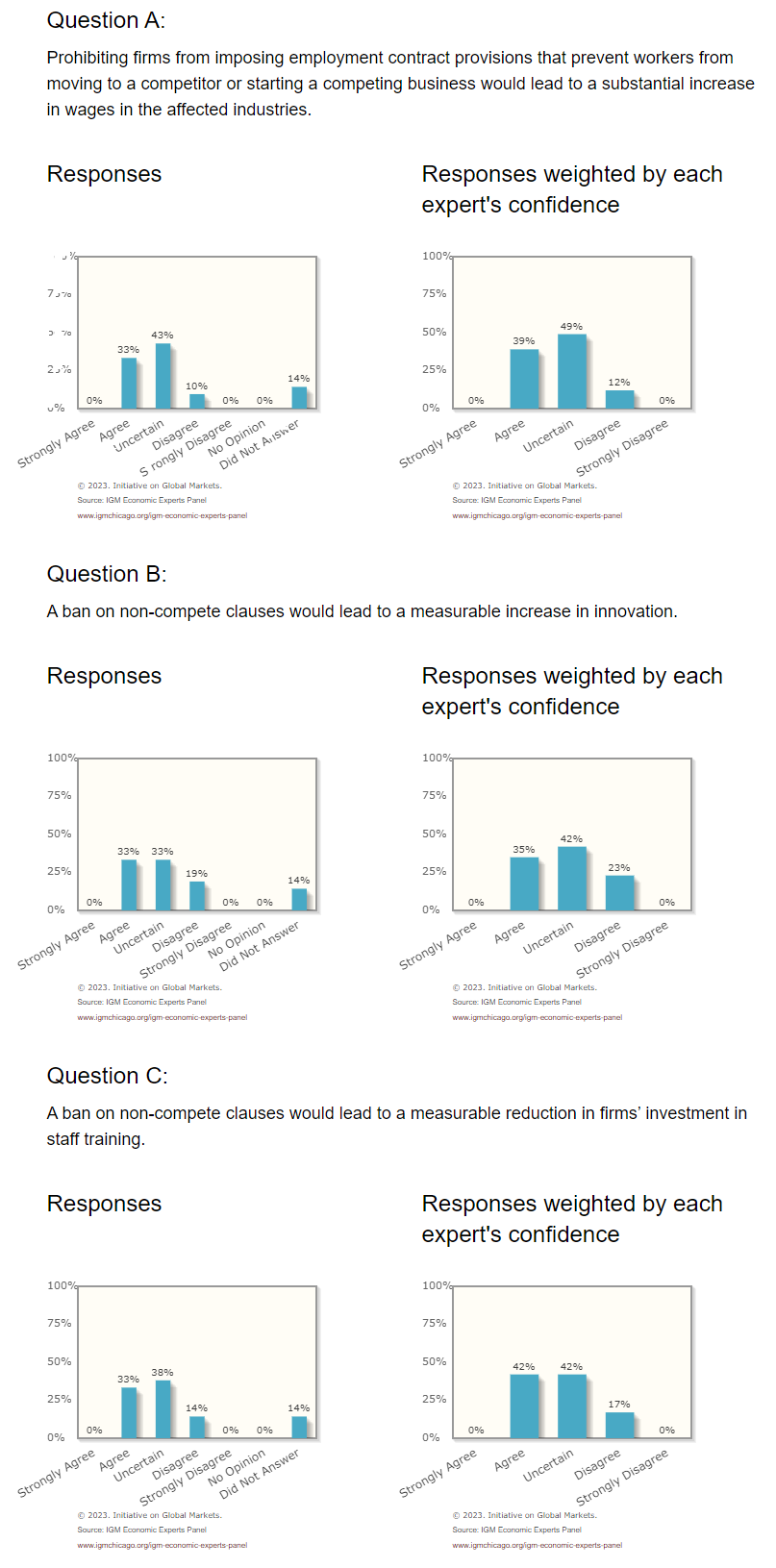
Economist Emily Oster did a similar literature review for gas stoves, found similar (arguably much greater) limitations, and came up similarly skeptical of a national ban:
What to take from this? We know that gas stoves emit nitrogen oxides and that, in general, those are not good. We know that air pollution, in general, is bad for respiratory symptoms, including asthma. So it seems very plausible that there is some link here. However: the magnitude is likely small. In most of the estimates, it’s small. And, beyond that, we do not see the kind of smoking gun in any of these data that would suggest a really consistent link.
Others have come to the same conclusion. The author of one the most-cited studies, meanwhile, openly admitted that it “does not assume or estimate a causal relationship" between childhood asthma and gas stoves. Even the folks over at E&E News, who generally disagreed with the stove-ban skeptics, concede most of Oster’s concerns regarding magnitude and causality and note that some of the studies cited are old or from places with cooking cultures far different from 21st century America.
“When we first did studies in the rural areas of the Netherlands 40 years ago, we found people were making meals that were on a low flame for hours to produce very thoroughly cooked meals, and we found enormously high nitrogen dioxide concentrations as a result,” one Dutch researcher acknowledged. “That doesn’t really happen anymore; people have microwaves and spend less time cooking their own meals.”
Indeed they do.
Now, this isn’t to say that there are no possible harms at all here or no legitimate reasons for concern. But the data limitations should at least give us pause when contemplating a nationwide ban of two common things—especially when digging deeper into these issues reveals far more complicated tradeoffs and realities than the prohibitionists acknowledge.
Going back to non-competes, for example, there’s literature—often by the same economists who found discrete harms elsewhere—showing that these provisions can actually increase compensation for certain types of workers (e.g., executives or doctors), can boost productivity in certain industries, can encourage firms to invest more in job training and information sharing (because trained workers can’t then jump ship), and can help small, innovative startups grow (because they can retain talent by blocking big competitors from poaching). These studies, of course, have limitations too, but their findings warrant as much consideration as the others when considering an outright ban. A blanket prohibition ensures we lose the benefits too.
A ban also ignores the massive amount of variety already in the market when it comes to non-competes and the workers subject to them. Judging from the online discourse, for example, you’d think that the overwhelming majority of non-competes have targeted unsuspecting low-wage workers (e.g., the notorious and egregious Jimmy John’s case), forcing them into years of indentured servitude. Yet, as a recent American Action Forum briefer shows, the state laws governing and the workers signing non-competes vary widely. Yes, some low-wage or low-education workers are caught up in non-competes, but so are older, wealthier, and more educated ones (and everyone in between):
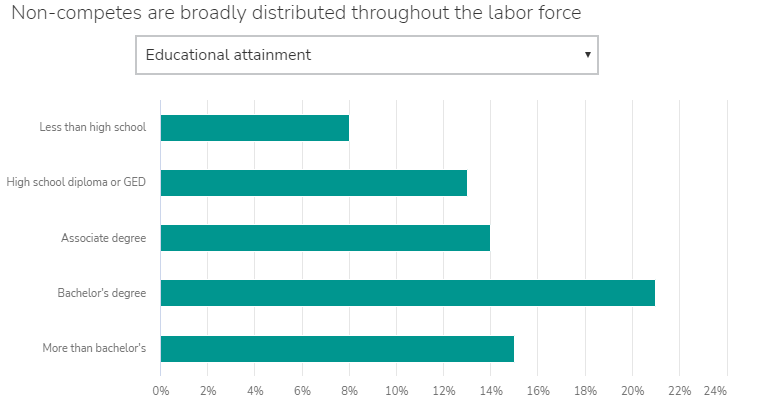
That paper also cites research showing that most non-competes—61 percent—aren’t sprung on workers after accepting job offers (29 percent were), and that many workers do read, consider, and renegotiate non-competes when employers require them.
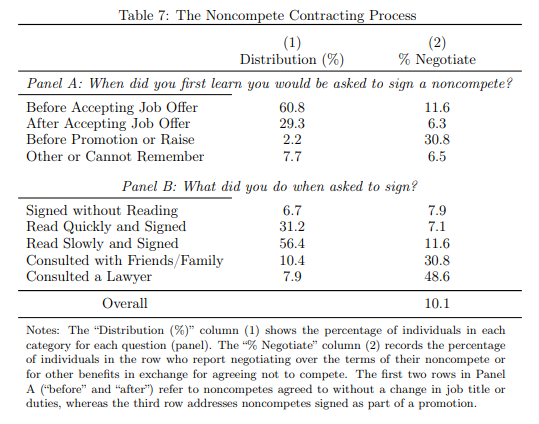
Workers can, of course, also walk away from employers demanding they sign a non-compete. Indeed, a recent Wall Street Journal piece mostly critical of these provisions notes that the article’s protagonist actually turned down the job he was offered because “the company declined to change the noncompete clause.” Others have surely done the same.
AAF also shows that regulation of non-competes varies widely across the country:
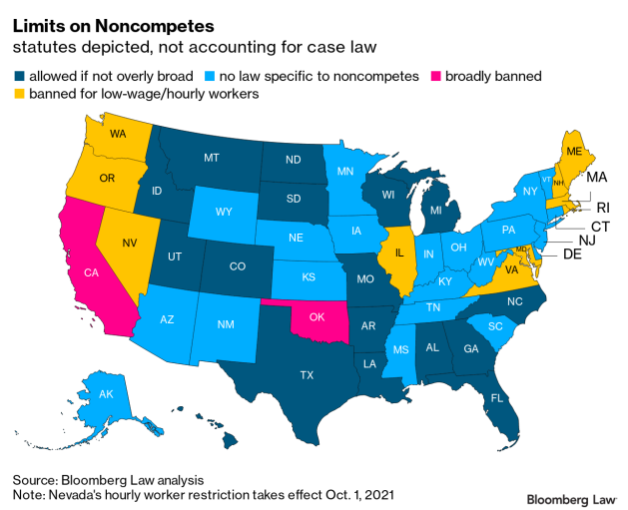
Indeed, Jimmy John’s dropped its non-compete provision—which is admittedly ridiculous, though much narrower than imagined—and voided past ones in the mid-2010s after several attorneys challenged them as unconscionable and unenforceable under their state laws.
For gas stoves, the tradeoffs are simpler: Because they’re great for cooking, prevalent in many states, and relatively cheap, banning them would force U.S. consumers to retrofit their kitchens (for those wanting or needing to replace their old gas stoves) and/or to buy an obviously inferior electric coil range or an induction range that’s admittedly neat technology but still a niche, expensive product (to buy or repair) that might also require even more spending on new cookware. (Sounds a lot like electric vehicles, really.)
And, again, there’s a lot of nuance and variety in the current market. That E&E piece, for example, noted that potential harms to children “can vary widely” based on the age of a stove and “because other factors like construction, ventilation and cooking habits can impact how long emissions linger in the home. Larger homes with better ventilation would disperse pollutants released by gas stoves more easily compared with smaller ones, for example.” It also notes that the risk to older, more cramped apartments may be one reason why there are already “bans on gas hookups for buildings in urban centers, like Berkeley, Calif.; New York City; and Washington, D.C., where ventilation may be more of a concern.” None of this argues for a one-size-fits-all national ban.
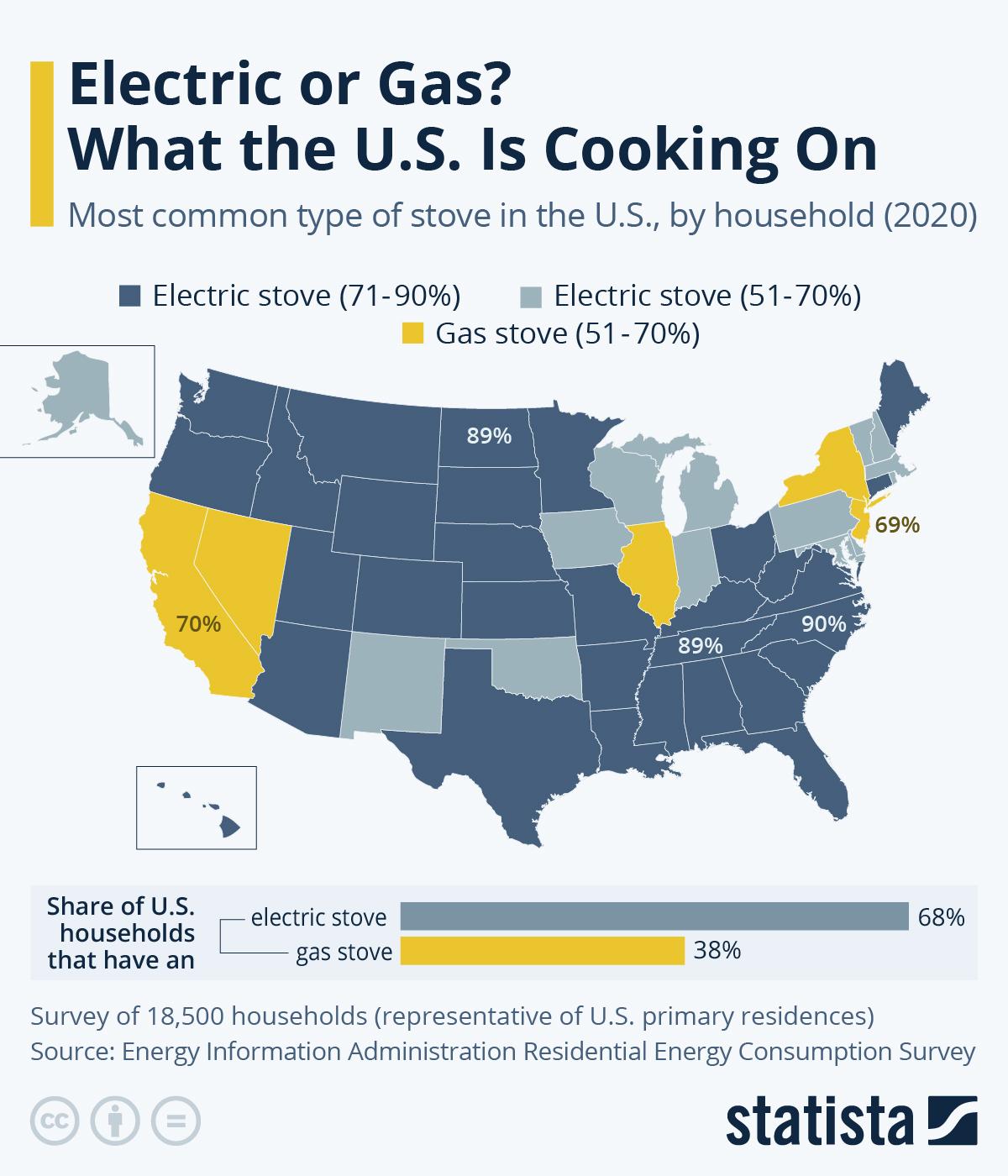
Speaking of markets, bans also never seem to consider how they change, often in ways that totally undermine the need for a ban in the first place. As already noted, changing gas stove technology, stronger range fans, larger homes, and different cooking techniques could obviate much of the health risks (assuming they really exist) that, say, a gas stove in 1980s Manhattan may have posed. For non-competes, meanwhile, the U.S. labor market of the 2010s—wherein employers had the leverage to perhaps coerce workers into signing (or not challenging) non-competes—has given way to one where workers have the upper hand and are thus quitting or scaling back hours in historic numbers.
In this light, the urgent need for a federal administrative remedy becomes a lot less clear, and countervailing considerations (e.g., for consumers or companies) or unintended consequences might have more weight.
These considerations are particularly important for a government-ordered ban, given its totality and—as Albrect notes in a separate piece citing Hayek and Sowell (so you know it’s good!)—the fact that state isn’t exactly great at changing course as the relevant literature and markets evolve:
Let’s accept for the sake of argument that all of the best experts today agree that noncompetes are a net negative for society. We have to deal with the fact that we can be proven wrong in the future, and different regimes will deal with that future change differently.
If implemented, the FTC’s total ban of noncompetes replaces the decision making of businesses and workers, as well as the oversight of state governments, with a one-size-fits-all approach. Under that new regime, we need to ask: How quickly will they respond to new information—for example, that it had destructive implications? How easily can they make incremental changes?
One may hope the FTC, as an expert-led agency, could easily adjust to incoming evidence. They will just follow the science! But that response would be self-contradictory here. The FTC just showed that it is happy to go from 0 to 100 with its rules. It went from doing hardly any work on noncompetes to a total ban. In no optimal policy model where the benevolent regulator is responding to information is that how a regulator would process and act on information.
I would hope that, by now, readers of this newsletter know the answers to the bolded questions. Lovers of butter and eggs surely do too. (Spoiler: neither quickly nor easily.) And this doesn’t even get into the politics, or how new regulations so often create powerful new interest groups that benefit financially from a new regulation and thus strongly resist any changes thereto.
… And So Do Less Severe Alternatives
All of this nuance and variation leads to the next problem with a total, nationwide ban: It utterly ignores the numerous alternative policies that could mitigate the most significant costs or abuses identified while preserving many of the benefits, avoiding unintended consequences, and preserving the freedom of most individuals to make voluntary, eyes-wide-open decisions with which some people (ahem) might disagree. On non-competes, for example, I think there’s a legitimate concern about their effects on some workers’ mobility, their application to certain workers with few options or financial resources (e.g., for a legal challenge), or a lack of transparency or advance disclosure in certain cases. Some really smart people whom I greatly respect think non-compete abuse is a big problem. But the abuses argue for policies well short of a blanket ban. Maybe there need to be rules that non-compete provisions and their effects be disclosed (and enforced by courts) only where workers have expressly consented. Maybe there need to be rules about non-competes’ language and geographic reach, or about the industries or workers to which they can and can’t apply. (There are, by the way, already a lot of these rules in place.)
And on gas stoves, one could easily foresee rules regarding emissions or leakage, ventilation, or construction (especially for small apartments).
Blanket bans ignore all of this. Indeed, as noted, the non-compete ban goes even further than just a prospective ban:
The proposed rule would also require companies with existing noncompete agreements to scrap them and to inform current and past employees that they have been canceled.
“That’s part of what makes this so radical,” said Michael Schmidt, a labor and employment attorney at Cozen O’Connor in New York. Not only is “the federal government taking this action broadly but with practically no exception.”
The effects of such a retroactive intrusion into millions of private contracts by a federal agency—and the precedent it establishes—are utterly ignored by the prohibitionists. It’s just all gravy, baby.
Finally, there’s the question of why—leaving aside some legitimate questions of these bans’ legality under U.S. law—a federal remedy needs to be imposed at all here. As noted, states and localities across the country have already examined these issues and applied remedies that are likely better tailored to their specific situation. George Mason’s Tyler Cowen provides a good example regarding non-competes in California:
As a matter of law, the state of California does not enforce noncompete agreements. This has stimulated its technology sector and its startup environment. But the California economy has some special features. The tech world is a series of interlocking pieces that make each one stronger, and many of the best-known companies have strong moats. With or without noncompetes, it is hard to just walk away from a major tech company and start competing with it. Such a company, in turn, is not so afraid to impart special knowledge to its workers. The non-enforceability of noncompetes in California seems like the right policy. But it might not be appropriate in, say, Nebraska.
Most states already limit noncompete provisions and insist that they take a reasonable form. The current mix of restrictions may not be ideal, but the status quo hardly gives unfettered reign to the practice. It leaves some room for noncompetes and allows states to apply legal and regulatory discretion. For instance, in recent years Oregon, Massachusetts and Washington all passed laws limiting noncompetes for low-wage workers only. Might that be a superior approach? Federalism could provide an answer, but a national ban would not.
Federalism would also allow for more state experimentation (and thus study) and policy competition—if non-competes really are terrible for an economy and workers, then legal restrictions on their use should attract much-coveted workers, especially in this era of remote work. The need for a federal remedy, excepting perhaps where interstate commerce is clearly and directly implicated (and no, this doesn’t count), seems minimal.
Summing It All Up
Readers will hopefully have noticed by now that I barely brought up any traditional libertarian arguments regarding how federal bans obviously infringe on individual liberty—to buy what we want or to contract how we want, regardless of whether others think such actions are wise or healthy. That omission was intentional: I obviously have concerns about these things too, but I don’t expect everyone else to share them. Instead, prudential concerns alone provide plenty of reasons for people to be a lot more ban-shy than many currently are. And they also provide us with a handy list of practical questions to ask and answer before jumping on the federal ban-wagon (pun!):
- Just how extensive and definitive is the relevant economic or scientific research?
- What are the tradeoffs?
- Do effects vary widely by location, individual, industry, etc.?
- Has the market changed, and might it change again?
- Are there less intrusive alternatives?
- Are states or localities already handling it, and is an overriding federal remedy really necessary (and legal)?
Admittedly, checking through this list would probably lead to fewer federal regulations, but it’d also produce a saner and more effective approach to national policymaking. And given reams of historical precedent on any number of past prohibitions—alcohol, vaping, raw milk, payday lending, lightbulbs, properly flushing toilets, and so on—a little more humility is most definitely in order.
Chart of the Week
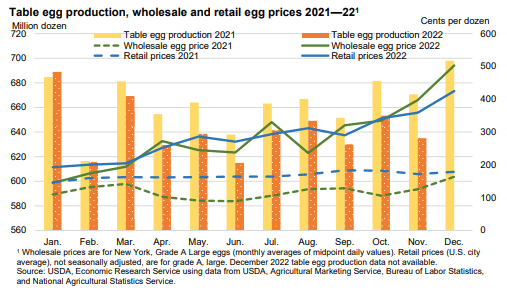
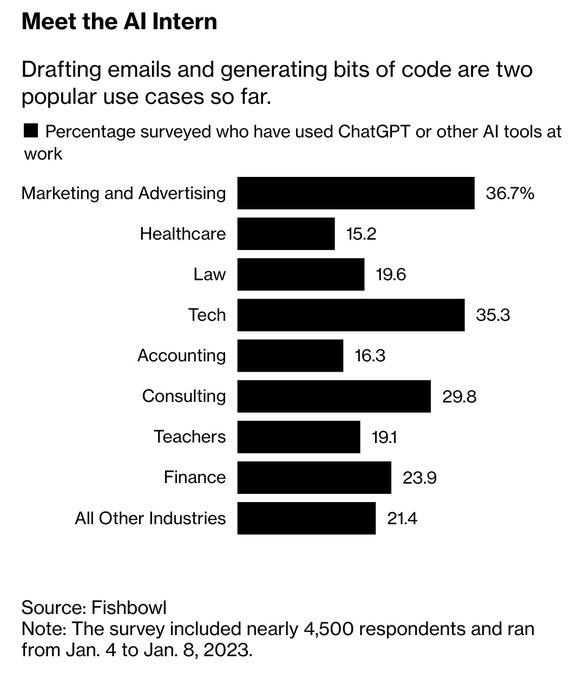
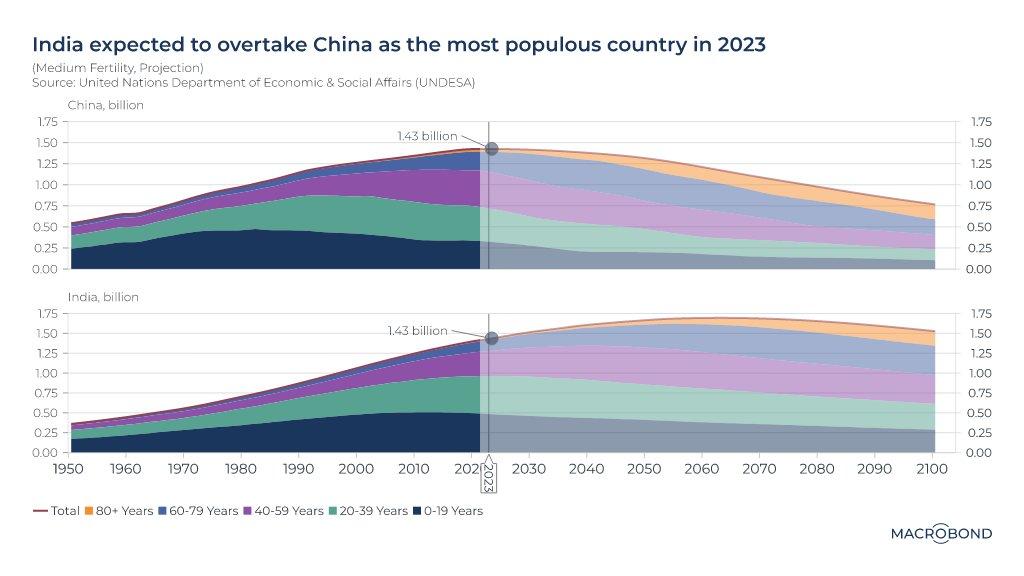







Please note that we at The Dispatch hold ourselves, our work, and our commenters to a higher standard than other places on the internet. We welcome comments that foster genuine debate or discussion—including comments critical of us or our work—but responses that include ad hominem attacks on fellow Dispatch members or are intended to stoke fear and anger may be moderated.
With your membership, you only have the ability to comment on The Morning Dispatch articles. Consider upgrading to join the conversation everywhere.